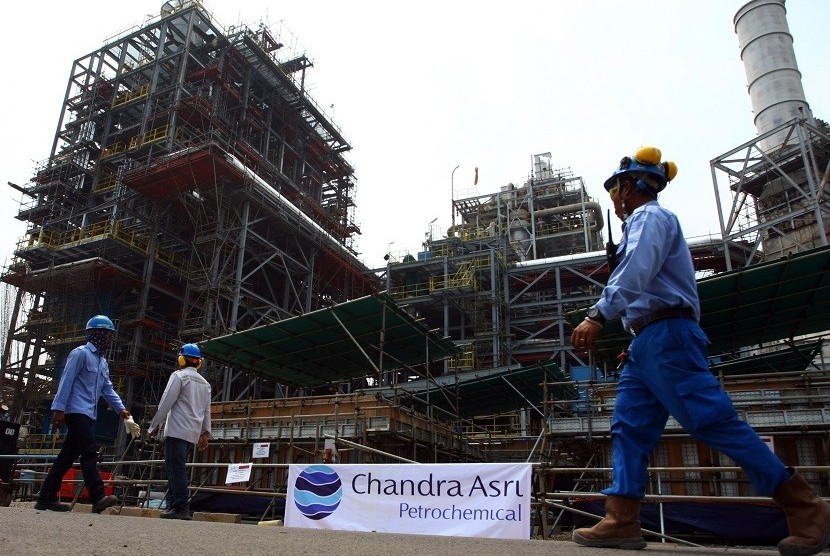REPUBLIKA.CO.ID, JAKARTA -- Falling price of naphtha has been a great boon for publicly traded petrochemical company PT Chandra Asri Petrochemical Tbk (CAP).
The country's largest petrochemical company chalked up US$26.3 million in net profit in 2015 or an increase of 42.4 percent from the previous year.
Human Resources & Corporate Administration officer of CAP Suryandi attributed the increase in profit to falling price of naphtha the main basic material for its petrochemical materials.
"We stopped operation for 85 days to overhaul the factory resulting in a 44 percent decline in net income to US$1,377.7 million in 2015. However, the decline in income was offset by naphtha price fall in mid 2015," Suryandi said here on Tuesday.
Naphtha is a by product of oil refinery used as a feed stock for petrochemical materials mainly ethylene.
Suryandi predicted the naphtha price would continue to fall through 2016 and 2017 that the company is highly optimistic that it would continue to enjoy more years of high profit.
"Around 90 percent of naphtha needed by the company is imported with only around 10 percent supplied domestically. The production cost, therefore, depends much on naphtha prices in international market.
Naphtha price fell to follow the shrinking oil prices in the world market.
Suryandi said the company overhauled its factory, adding overhaul is required every four years.
In 2015, overhaul was made to coincide with expansion of production capacity for ethylene from 600,000 tons to 860,000 tons a year, he said.
He said the capacity expansion for ethylene resulting in an increase in the production capacity for derivative polypropylene to 480,000 tons.
"So far imports are needed for 30 percent of the country's polypropylene requirement, but with the capacity expansion, imports could be cut significantly," he said.
He said the company also started work in 2015 to build a synthetic rubber factory under subsidiary PT Synthetic Rubber Indonesia.
The project valued at US$435 million is a joint venture between CAP and Michelin with CAP a 45 percent shareholder and the giant French tire maker a 55 percent owner.
The factory is scheduled to be operational in early 2018 with a production capacity of 120,000 tons of synthetic rubber per year.
Synthetic rubber is used mainly to feed factories producing premium tires, which have not yet been produced domestically.
Suryandi said the capacity expansion and the synthetic rubber factory are expected to contribute to healthier performance of the company in the coming years and to development of integrated petrochemical industry in the country.
The company also a major supplier of plastic basic material in the country although almost 50 percent of the requirement is still imported.
Plastics are needed as basic material for food and beverage containers and automotive component , not only for plastic bags , the use of which have been restricted in the country.
Suryandi said the largest contributor to the income of the company is polyolefin, which is a derivative of polypropylene and polyethylene, accounting for 63 percent.
Other main contributors are styrene monomer accounting for 19 percent, olefin for 12 percent and butadiene,a feed stock for synthetic rubber, for 6 percent.
Chandra Asri Petrochemical is the largest vertically integrated petrochemical company in Indonesia with facilities located Cilegon and Puloampel, Banten Province.
Its facilities include the Lummus Naphtha Cracker producing high quality Ethylene, Propylene, Mixed C4, and Pyrolysis Gasoline (Py-Gas) for domestic consumption and exports.
CAP also has integrated polyethylene and polypropylene production facilities. It has wholly owned subsidiaries - PT Styrindo Mono Indonesia (SMI) and PT Petrokimia Butadiene Indonesia (PBI).
Styrindo Mono Indonesia (SMI) in Puloampelis the only Styrene Monomer producer in Indonesia serving both domestic downstream industries and regional export markets.
The plant produces Styrene Monomer with a capacity of 340,000 tons per year.
Petrokimia Butadiene Indonesia (PBI) is the first butadiene plant in Indonesia that produces the feed stock for synthetic rubber with a capacity of 100,000 tons per year.


